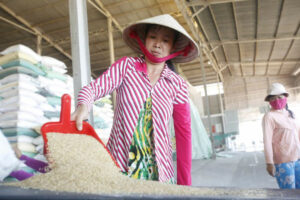
PHL farm trade deficit widens 13.8% in Q2
THE deficit in the trade of agricultural goods expanded 13.8% year on year in the second quarter to $3.07 billion, according to preliminary data from the Philippine Statistics Authority (PSA).
In a report, the PSA said overall trade — or the sum of exports and imports — rose 14.3% to $6.79 billion during the quarter, against a 14.7% decline a year earlier.
Agricultural exports rose 14.7% to $1.86 billion for the three-month period, accounting for 10.2% of total exports.
Edible fruit and nuts as well as peel of citrus fruit and melons took up the largest share of farm exports, valued at $543.62 million or 29.2% of the total.
Agricultural products shipped to Association of Southeast Asian Nations (ASEAN) countries accounted for 8.8% of total exports at $227.24 million.
The top ASEAN exports were animal, vegetable, or microbial fats and oils and their cleavage products; prepared edible fats; and animal or vegetable waxes amounting to $91.74 million.
Malaysia was the Philippines’ top export market for farm goods during the second quarter, accounting for $95.22 million or 41.9% of all ASEAN farm exports.
It added that trade to the European Union (EU) consisted of 18.6% of overall agricultural exports, amounting to $358.93 million.
“Among the EU member countries, the Netherlands was the country’s top destination of agricultural commodities worth $179.77 million, or 50.1% of the total agricultural exports to EU member countries for this quarter,” the PSA said.
Animal or vegetable fats and oils and their cleavage products, prepared edible fats and animal or vegetable waxes were the top agricultural exports to the region.
The PSA also reported that the import of agricultural goods rose 14.1% year on year to $4.94 billion in the three months to June.
In April, President Ferdinand R. Marcos, Jr. issued Administrative Order No. 20 instructing the departments of Agriculture, Finance, and Trade and Industry to simplify the administrative procedures for agricultural imports, as well as remove non-tariff barriers.
Cereals remained the top agricultural import for the second quarter at 26% of the total, valued at $1.28 billion.
For the period, imports of agricultural goods from ASEAN were valued at $1.86 billion or 16.4% of total imports. Cereals were the top commodities imported from ASEAN.
“Vietnam was the leading supplier of agricultural products to the Philippines among ASEAN member countries,” the PSA said, with $686.60 million.
It added that imports from the EU amounted to $450.29 million or 24.6% of farm imports by value in the quarter.
Spain was the top EU supplier of farm goods, accounting for $122.27 million or 27.2% of overall farm imports.
Meat and edible meat offal were the top imports from the EU, followed by dairy, eggs, honey, and edible products of animal origin. — Adrian H. Halili



